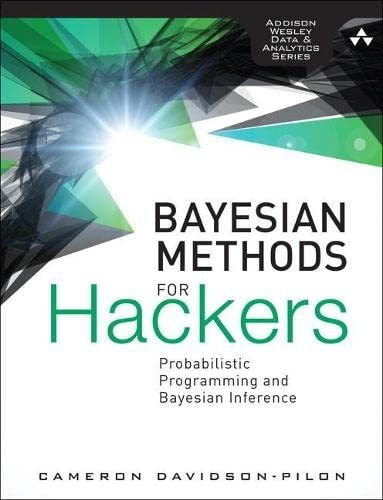Book : Bayesian Methods For Hackers Probabilistic...
Llega gratis el martes 11 de junio
Solo en CABA y zonas de GBA
Comprando dentro de los próximos 13 min
Retirá gratis entre el 11 y el 14/jun en correo y otros puntos
Ver en el mapaDisponible 14 días después de tu compra
MercadoLíder | +10mil ventas
MercadoLíder Platinum
+10mil
Ventas concretadas
Brinda buena atención
Medios de pago
Hasta 12 cuotas sin tarjeta
Tarjetas de crédito
Tarjetas de débito
Efectivo





Descripción
- ANTES DE COMPRAR PREGUNTE FECHA DE ENTREGA.
- ENVIAMOS POR MERCADOENVIOS
- PUEDE RETIRAR POR AHORA SOLO POR QUILMES, MICROCENTRO ESTA CERRADO, POR ESO...
- EN CABA (CAPITAL FEDERAL) ENVIAMOS SIN CARGO ESTE PRODUCTO.
- FORMA DE PAGO : MERCADOPAGO
- HACEMOS FACTURA A.
- ELBAZARDIGITAL VENDEDOR PLATINUM
- TODOS NUESTROS PRODUCTOS EN:
https://eshops.mercadolibre.com.ar/elbazardigital
-X-X-X-
- SOMOS IMPORTADORES DIRECTOS, ESTE PRODUCTO SE COMPRA Y SE IMPORTA DESDE ESTADOS UNIDOS, ESTO IMPLICA QUE USTED ESTA COMPRANDO EL MISMO PRODUCTO QUE COMPRARÍA UN CLIENTE DE ESE PAÍS.
- ANTES DE REALIZAR UNA CONSULTA, VISUALICE TODAS LAS IMAGENES DEL PRODUCTO.
Descripción provista por la editorial :
Master Bayesian Inference through Practical Examples and Computation-Without Advanced Mathematical Analysis Bayesian methods of inference are deeply natural and extremely powerful. However, most discussions of Bayesian inference rely on intensely complex mathematical analyses and artificial examples, making it inaccessible to anyone without a strong mathematical background. Now, though, Cameron Davidson-Pilon introduces Bayesian inference from a computational perspective, bridging theory to practice-freeing you to get results using computing power. Bayesian Methods for Hackers illuminates Bayesian inference through probabilistic programming with the powerful PyMC language and the closely related Python tools NumPy, SciPy, and Matplotlib. Using this approach, you can reach effective solutions in small increments, without extensive mathematical intervention. Davidson-Pilon begins by introducing the concepts underlying Bayesian inference, comparing it with other techniques and guiding you through building and training your first Bayesian model. Next, he introduces PyMC through a series of detailed examples and intuitive explanations that have been refined after extensive user feedback. You’ll learn how to use the Markov Chain Monte Carlo algorithm, choose appropriate sample sizes and priors, work with loss functions, and apply Bayesian inference in domains ranging from finance to marketing. Once you’ve mastered these techniques, you’ll constantly turn to this guide for the working PyMC code you need to jumpstart future projects. Coverage includes * Learning the Bayesian “state of mind” and its practical implications* Understanding how computers perform Bayesian inference* Using the PyMC Python library to program Bayesian analyses* Building and debugging models with PyMC* Testing your model’s “goodness of fit”* Opening the “black box” of the Markov Chain Monte Carlo algorithm to see how and why it works* Leveraging the power of the “Law of Large Numbers”* Mastering key concepts, such as clustering, convergence, autocorrelation, and thinning* Using loss functions to measure an estimate’s weaknesses based on your goals and desired outcomes* Selecting appropriate priors and understanding how their influence changes with dataset size* Overcoming the “exploration versus exploitation” dilemma: deciding when “pretty good” is good enough* Using Bayesian inference to improve A/B testing* Solving data science problems when only small amounts of data are available Cameron Davidson-Pilon has worked in many areas of applied mathematics, from the evolutionary dynamics of genes and diseases to stochastic modeling of financial prices. His contributions to the open source community include lifelines, an implementation of survival analysis in Python. Educated at the University of Waterloo and at the Independent University of Moscow, he currently works with the online commerce leader Shopify. About the Author Cameron Davidson-Pilon has seen many fields of applied mathematics, from evolutionary dynamics of genes and diseases to stochastic modeling of financial prices. His main contributions to the open-source community include Bayesian Methods for Hackers and lifelines. Cameron was raised in Guelph, Ontario, but was educated at the University of Waterloo and Independent University of Moscow. He currently lives in Ottawa, Ontario, working with the online commerce leader Shopify.
-o-o-o-
Garantía del vendedor: 90 días
Preguntas y respuestas
¿Qué querés saber?
Preguntale al vendedor
Nadie hizo preguntas todavía.
¡Hacé la primera!

